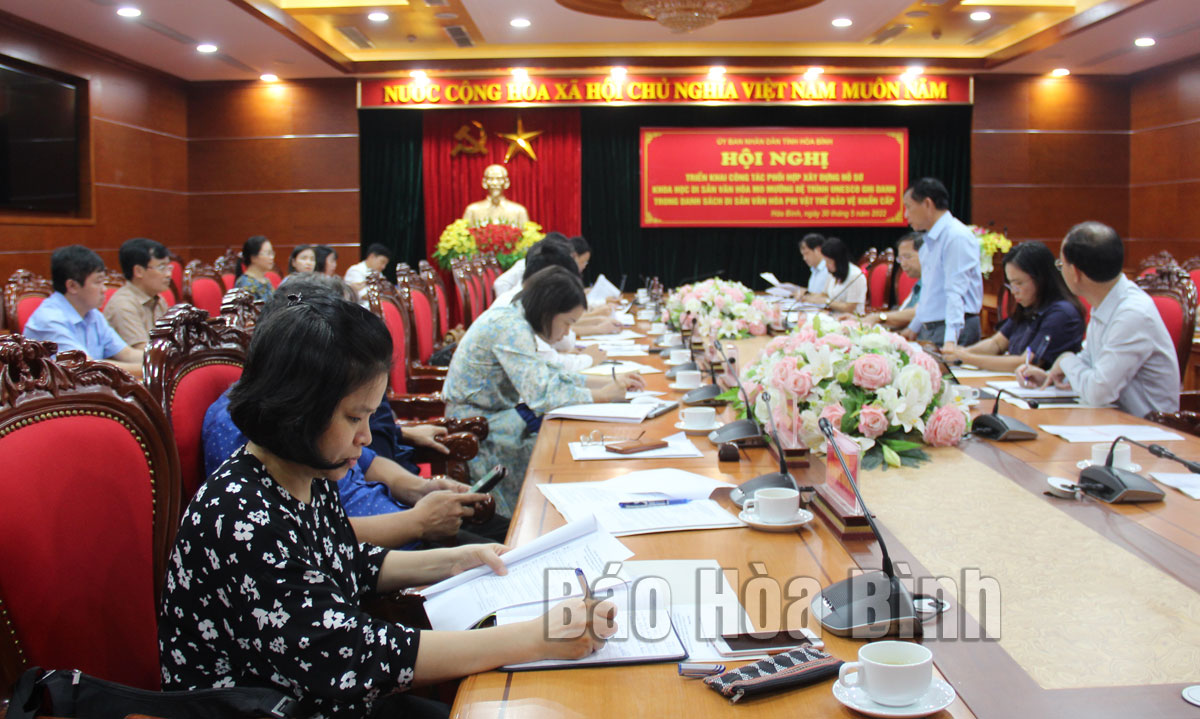
(HBO) – The People’s Committee of Hoa Binh province has organised a conference on coordination in building a dossier for Mo Muong to be included in the UNESCO List of Intangible Cultural Heritage in Need of Urgent Safeguarding.
The event saw the attendance of Deputy Minister of Culture, Sports and
Tourism Hoang Dao Cuong and representatives from the Vietnam National Academy
of Music and the People’s Committees of Hanoi, and Dak Lak, Son La, Phu Tho,
Thanh Hoa and Ninh Binh provinces.
Photo: Bui Van Khanh, Deputy Secretary of the
provincial Party Committee and Chairman of the provincial People’s Committee,
concludes the conference.
According to the provincial Department of
Culture, Sports and Tourism, the provincial People’s Committee issued Plan No.
220/KH-UBND on November 25, 2011, on the coordination.
The department has sent documents to cities and
provinces, asking for joint efforts in building the dossier, and partnered with
the Vietnam National Academy of Music to conduct research studies and organise
seminars.
The sides have identified the targeted heritage
– Mo Muong, a collection of verses recited at traditional Muong funerals.
Among the localities that are reviewing the list
of Mo Muong, the central province of Thanh Hoa has done the work.
Participants at the conference looked into tasks
of the localities, the progress of the dossier building and next steps, along
with capital allocation for the project.
Deputy Minister of Culture, Sports and Tourism
Hoang Dao Cuong stressed that the building of the dossier is an urgent task.
He said the localities should send the dossier
to the ministry by December this year, which will be assessed before January
31, 2023 and submitted to UNESCO no later than the end of March 2023.
However, the work remains sluggish, he said,
asking Hoa Binh and other localities to speed up and outline a specific
roadmap, with quality and efficiency ensured.
Bui Van Khanh, Deputy Secretary of the
provincial Party Committee and Chairman of the provincial People’s Committee,
spoke highly of opinions raised by experts and localities, which, he said, will
help Hoa Binh consolidate and complete the dossier soon./.
Phong Phu commune, Tan Lac district of Hoa Binh province, is widely regarded as the cultural heartland of the Muong ethnic group. Among its many traditional communities, Luy Ai hamlet (formerly Ai hamlet) stands out as a rare location where the customs and way of life of the Muong Bi people remain largely intact.
The Truong Kha temple festival, a distinctive cultural event held every three years in Vu Ban township, Lac Son district, returned recently with vibrant rituals and folk traditions of the Muong people. Located next to the Buoi River in the Muong Trao fields, the Truong Kha Temple is dedicated to the three Kun Dol deities, revered for teaching farming techniques, irrigation, weaving, and protecting the harvest.
The demand for spaces serving community activities of residents in various areas across Hoa Binh city has been satisfied as local cultural houses now feature modern, spacious facilities thanks to the effective implementation of Resolution No. 49/NQ-HDND issued on December 28, 2021 by the city People's Council, which approved the plan for reorganising, converting, and allocating land for the construction, repair, and expansion of cultural houses in Hoa Binh’s villages and residential areas until 2025.
At the end of May, the Hoa Binh Provincial Ethnic Arts Troupe organized a series of performances for residents in Region 2 and Region 3 communes across the province. Bringing art to ethnic communities in remote, isolated, and especially disadvantaged areas has become a meaningful activity. These are not merely artistic performances but also journeys to disseminate cultural values, enrich spiritual life, and contribute to preserving the cultural identity of ethnic minorities.



